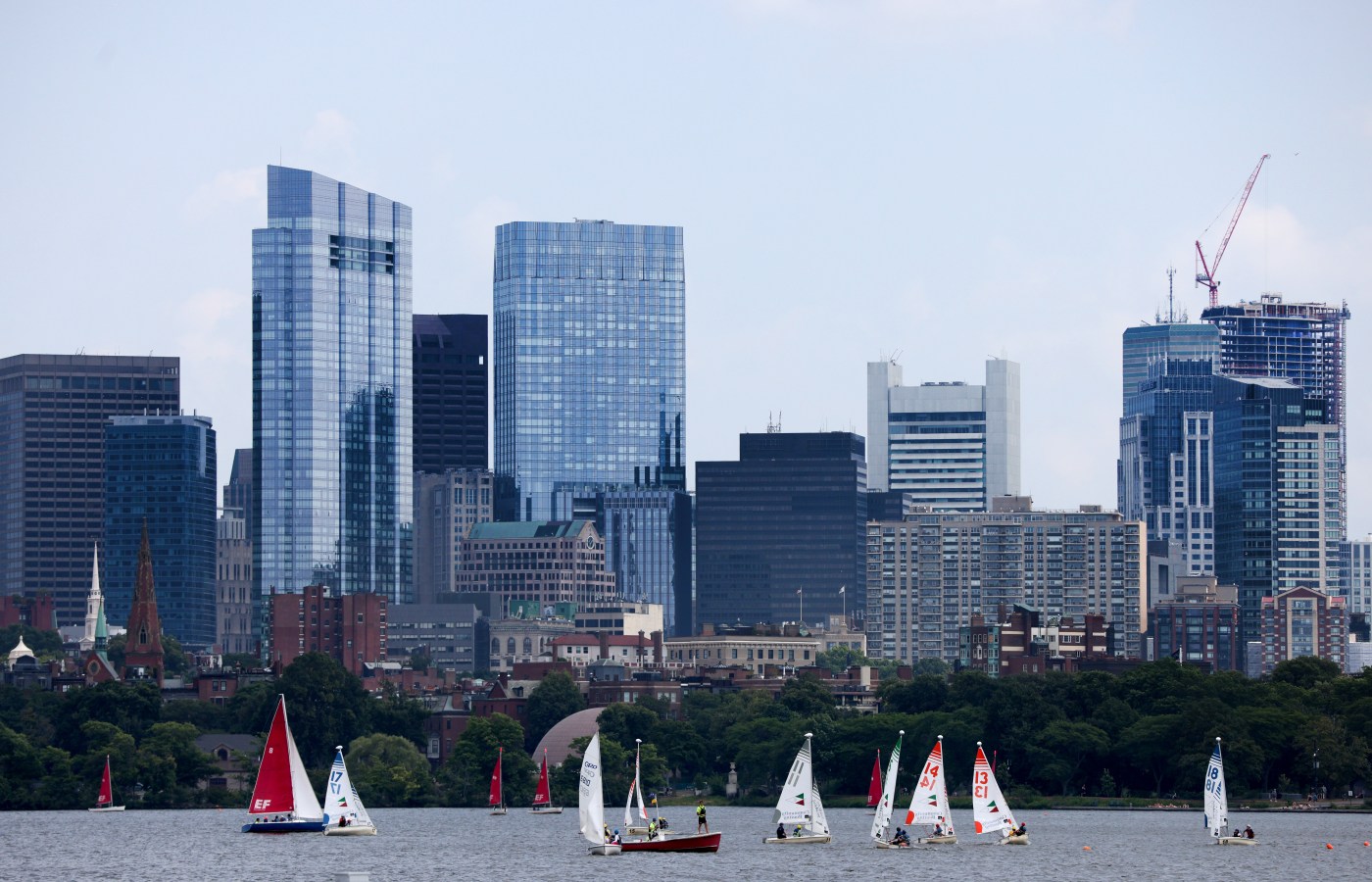
Critics rejoice as Boston Mayor Wu’s bid to raise commercial tax rates fails in Massachusetts Legislature
Boston Mayor Michelle Wu’s controversial plan to provide tax relief to homeowners by raising commercial tax rates stalled, and died for now, in the Massachusetts Senate, leaving the mayor disappointed and the bill’s critics taking a victory lap.
Wu’s last-ditch effort to appease concerns raised by a joint legislative committee — by agreeing to limit the scope and duration of her plan and providing tax relief to small businesses — won over the House, but failed to convince the Senate.
In the end, the measure did not come up for a vote and died by the close of the year’s formal legislative session.
“I’m still processing; I was up very late last night,” Wu told reporters Thursday, referencing the marathon legislative session that blew past the midnight deadline and wrapped up well into the next morning with no movement on many major bills.
“Obviously, I’m very disappointed,” Wu said. “Like so many other pieces of legislation, this one is too important for our residents for it to be over.”
Wu’s tax reclassification home rule petition, sent up to Beacon Hill after receiving City Council approval, cleared the Massachusetts House on Tuesday after the mayor was able to reach a last-minute compromise with House leadership.
The bill’s prospects in the Senate were quickly dashed, however, when Senate leadership, including the chamber’s president, Karen Spilka, made it clear that lawmakers there had not seen nor debated any of the changes made by the House, and were, therefore unlikely to take it up the day before the end of formal session.
Wu lobbied hard for the bill, which would have allowed the city to tax businesses beyond the state limit for the next few years to try to blunt the impact of declining commercial values and commercial tax revenue that is expected to shift more of the property tax burden onto residents, by way of the city’s budgetary structure.
The mayor has projected that dynamic could lead to a roughly 16.5% property tax hike for homeowners next year, and argued that such a steep increase would push many residents, both owners and renters, out of the city.
Wu made a last-ditch effort to push it past the finish line, by agreeing to reduce the plan’s duration from five to three years and lower the amount the city was able to tax businesses beyond the state’s 175% limit, from 200% to 190% — to no avail.
Whether the lack of action constituted the end of the road for the mayor’s plan was unclear on Thursday, with Wu saying that she had no intention to withdraw the bill and Spilka’s office saying the Senate will continue to review the legislation in informal sessions that will continue through the end of the year.
“This matter doesn’t become settled state law until next year’s tax bills have been mailed out to residents and mortgage servicers,” Wu said in a statement later in the day. “In the meantime, we will be working to communicate with residents about how their taxes may be significantly increasing under state law Prop 2 ½ without legislative relief, so that they can properly budget for their household finances next year.
“We have no intention of withdrawing this proven, reasonable, and balanced proposal, and we hope the Massachusetts Senate continues to deliberate so that residents aren’t forced to pay double digit tax increases,” the mayor said. “I want to thank the many, many community leaders and residents, workers and union partners who joined us in advocating to protect families in every neighborhood.”
A spokesperson for Senate President Spilka indicated that state lawmakers do not plan to close the door on the plan, either, saying, “As we enter informal legislative sessions the Senate will continue to review this policy proposal.”
Two other city home rule petitions failed to make it past the Legislature this week. The mayor’s push to legally restructure the Boston Planning and Development Agency failed to come up for a vote in either chamber. Lawmakers appeared to be heading toward an early-morning compromise on a bill that would create at least 200 new liquor licenses in Boston, but the deal ultimately fell apart.
The mayor’s tax plan generated the most buzz of the three city-sponsored pieces of legislation leading up to the end of session, and some critics could not contain their glee when it ran into the buzzsaw of Beacon Hill politics — marked by exceedingly frosty relations between the House and Senate in recent days.
“Egos may be bruised at the State House, but taxpayers should be feeling pretty good right now,” Paul D. Craney, spokesman for the Massachusetts Fiscal Alliance, said in a statement, while describing Wu’s attempt to raise commercial tax rates as “naive and misguided.”
Related Articles
Boston City Council urges Gov. Healey to abandon plan to kick migrant families to the curb after 5 days
Boston Police credit use of ShotSpotter with saving a shooting victim on Monday, but City Council remains skeptical
Boston mayor’s commercial tax rate plan clears the House, but hits a wall in the Senate
Boston’s Mass and Cass plan failed because it put housing before treatment, Massachusetts senator says
Boston City councilors, state senator seek emergency declaration over Steward closures
“Anyone who walks down the streets of Boston will immediately notice all the vacant commercial properties,” he said. “These empty office spaces represent the large-scale failures of the Wu administration. If Mayor Wu had her way, she would have made Boston’s economic recovery more painful and much slower.”
Craney called on Boston politicians to quit putting forward initiatives that provide free services on the taxpayers’ dime, and instead make the city more affordable by “lowering taxes and eliminating regulations.”
Critics, including business leaders and fiscal watchdogs, have said the mayor should have looked to cut, or slow the pace of, spending instead, pointing to a city budget that grew by 8% this fiscal year, and make use of the city’s roughly $1 billion in reserves.
“Boston, along with the state, need to focus on boosting competitiveness and investment, not driving it away,” Greg Vasil, CEO of the Greater Boston Real Estate Board, said in a statement. “Unfortunately, that’s exactly what Mayor Wu’s home rule petition to increase the city’s commercial property tax rate will do by forcing an industry already in distress to pay even more in taxes.
“We hope that the Senate will not take up this measure in the last four months of the legislative session,” he said, “and recommend that Boston first look to its own budget for fiscal discipline and savings before placing that burden on businesses.”


